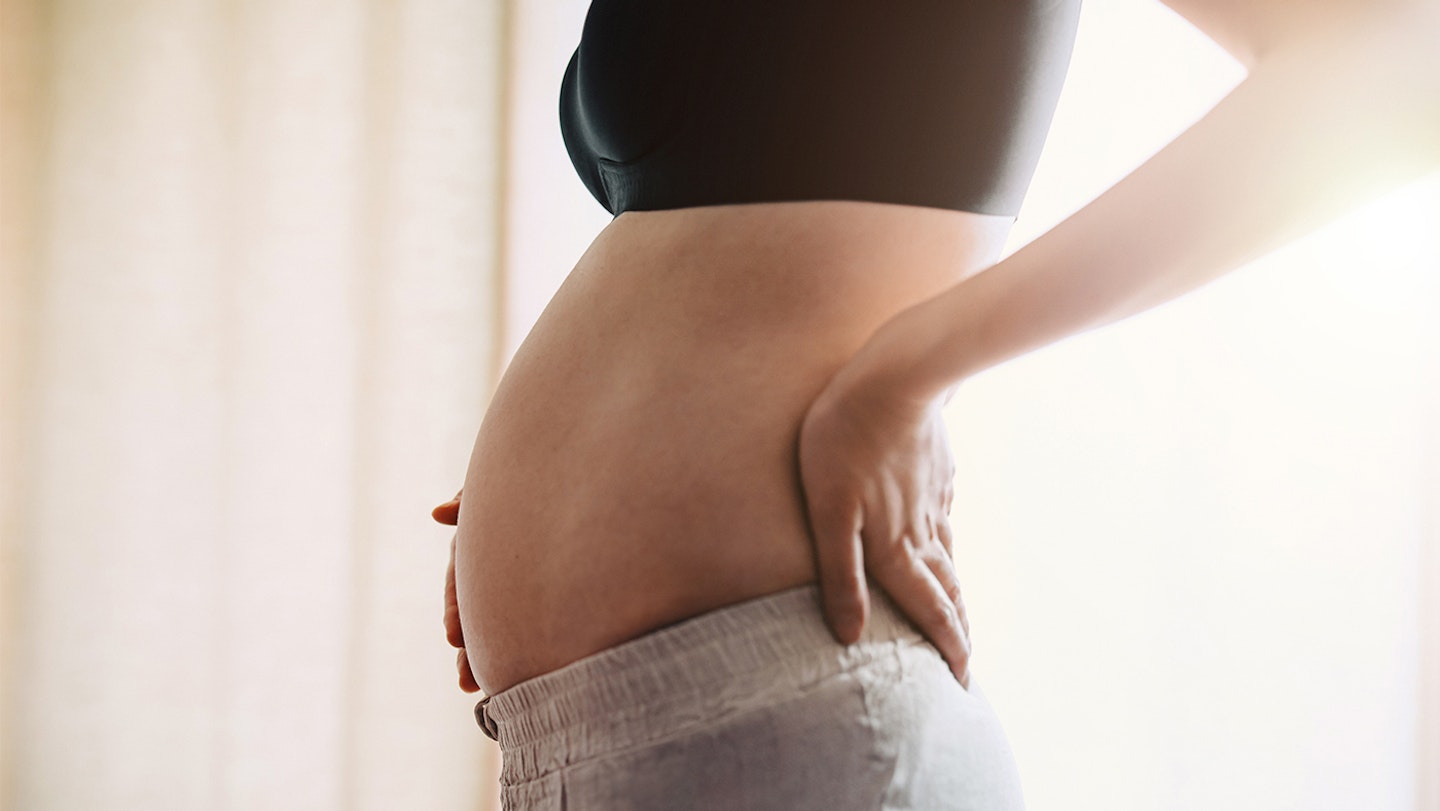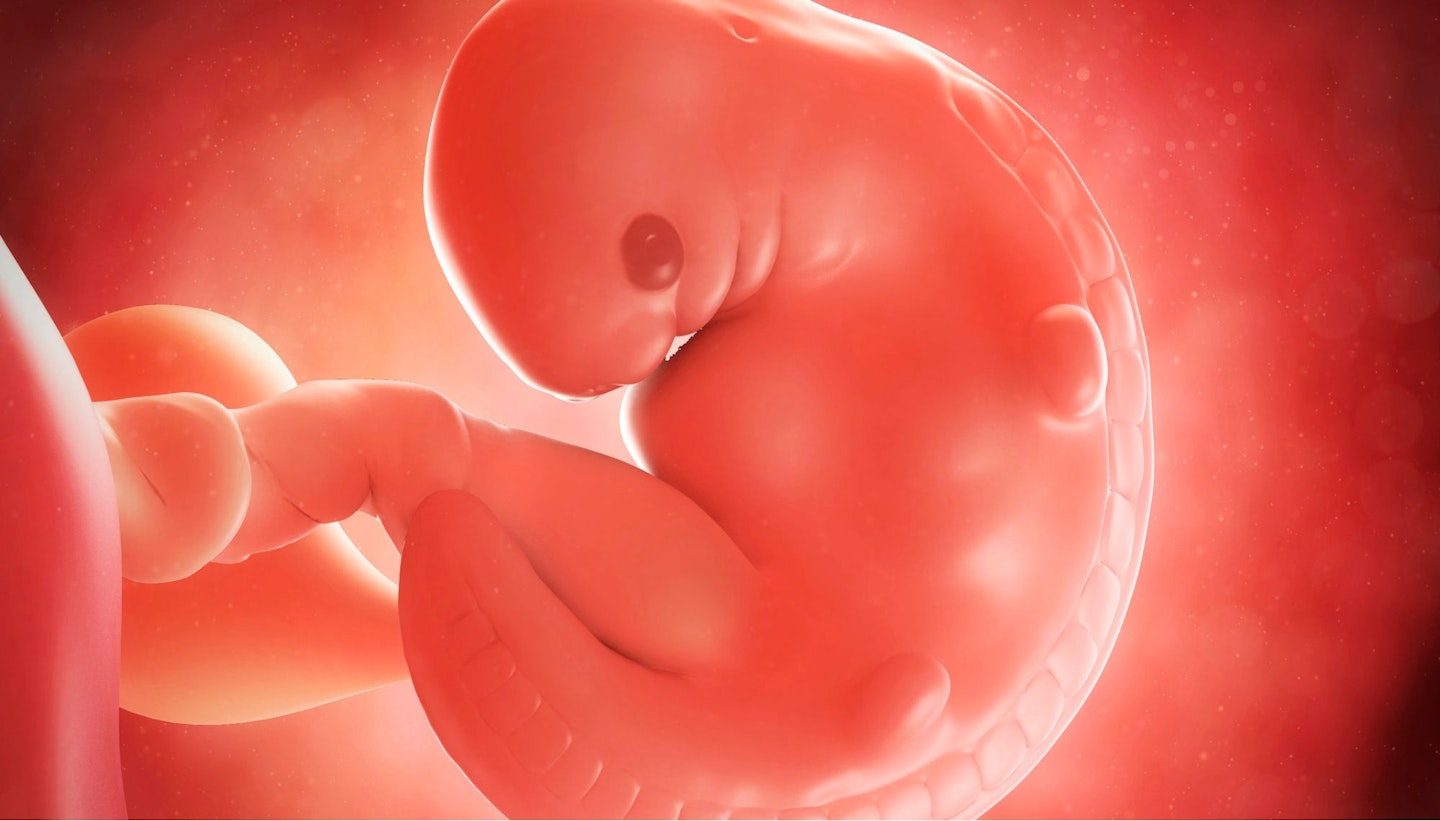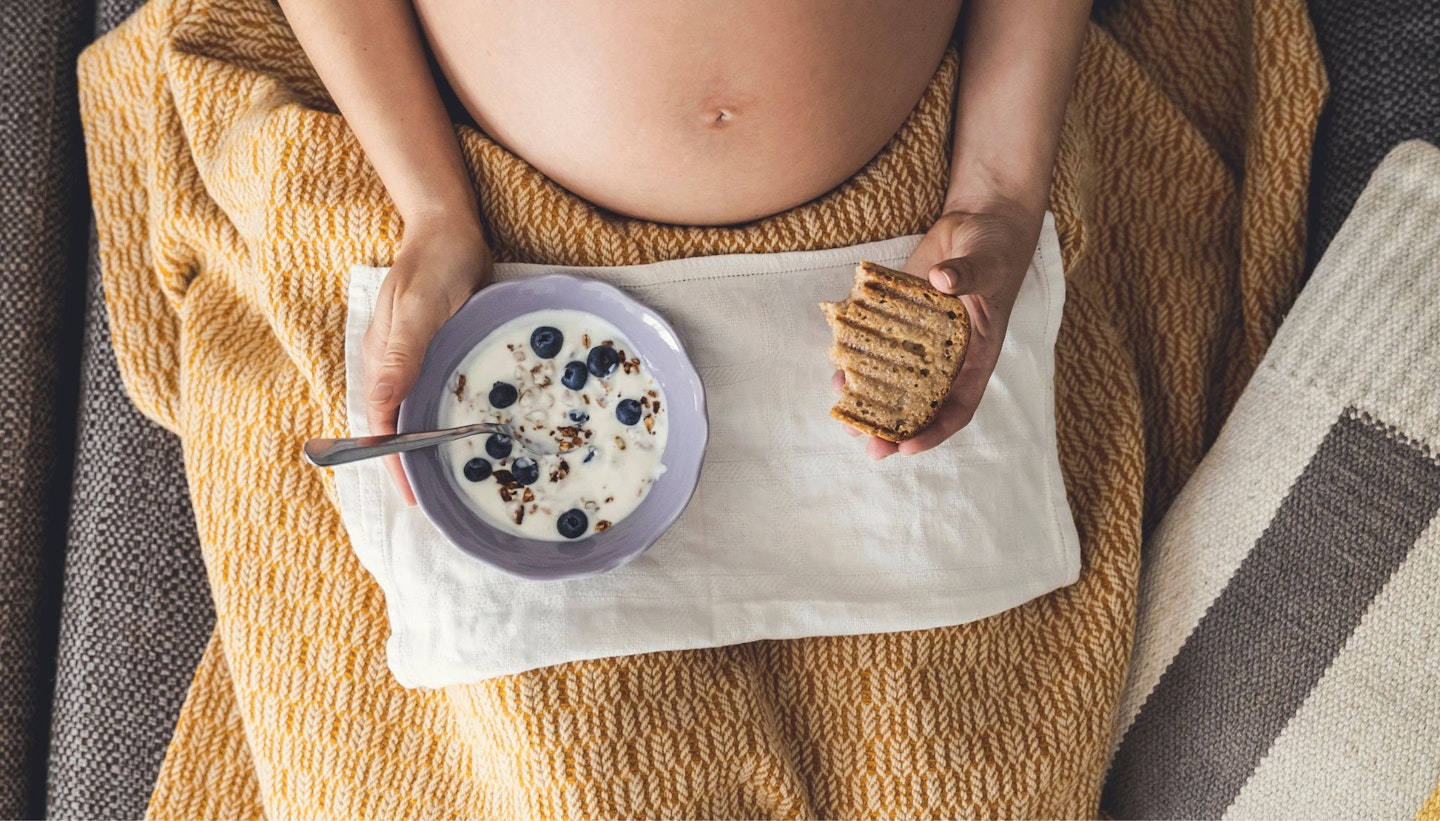Medically Reviewed by: Dr Amit Shah
The first trimester is probably the most exciting of your entire pregnancy – everything is so new, unknown - and yep, overwhelming. During the next 12 weeks, your baby will turn from a fertilised egg into a 3-inch human who is responsive to sounds. But what can you expect to happen in the coming weeks to your body and your baby? Dr. Claudia Pastorelli Mosca, Gynecologist and Obstetrician, Medical Advisor at Flo Health is here to explain more.
How long is the first trimester?
In the UK, the first trimester of pregnancy starts from the first day of your last period and lasts until you're 12 weeks pregnant.

First trimester changes in your body
During the first trimester of pregnancy, your body goes through many changes to support your growing baby. According to Dr Claudia Pastorelli Mosca, Gynecologist and Obstetrician, Medical Advisor at Flo Health most of these changes at this stage are internal, so not so much visible on the outside. You might see the ff: changes:
Breast changes
Swelling and tenderness: Pregnancy hormones cause your mammary glands to grow, making your breasts feel swollen and sensitive.
Visible veins and bumps: Blue veins may become more noticeable on your breasts, and small bumps might appear on your nipples.
Darker areolas: The area around your nipples (areolas) may darken in colour.
Linea nigra
Dark line on abdomen: You may see a faint dark line, called the linea nigra, running from your belly button downwards. This line typically becomes more visible after 20 weeks and fades after birth.
Uterus and belly growth
Expanding uterus: As your baby grows, your uterus expands. By the end of the first trimester, you might see a slight increase in belly size.
Internal changes
Increased blood volume: Your body produces more blood to supply oxygen and nutrients to your baby.
Faster heartbeat: Your heart starts beating faster to pump the additional blood needed.

First trimester changes with your baby
It all starts with the moment when the sperm meets the egg! After fertilisation, the egg divides into more and more cells, forming the baby and the placenta. The placenta is like the baby’s personal helper, providing oxygen and nutrients to help them grow.
Early stages
Cell division: Once the sperm and egg unite, they start dividing into a bunch of new cells. This is how the baby and placenta begin to take shape. These little cells are busy laying the foundation for everything—from the heart to the tiny fingers and toes!
Organ and body development
As the cells grow, they start to form the baby’s organs and body systems.
Neural tube: This tube is the blueprint for the brain and spinal cord, which control everything your baby will do!
Face and heart: The face starts to take shape, and the heart begins to beat. It’s the start of all those little baby hiccups!
Circulatory system: The heart and blood vessels start pumping to send oxygen and nutrients throughout the body.
Nervous system: The brain and spinal cord develop, which will allow your baby to feel and move as they grow.
Digestive and urinary systems: The digestive and waste-removal organs begin forming so your baby can process food and nutrients later on.
Limb development
Tiny arms and legs begin to appear! They might be small and wobbly at first, but these little buds will soon grow into fully formed arms and legs. Right now, your baby’s movements are too tiny to feel, but soon enough, those little kicks and wiggles will make themselves known!

What are the most common symptoms during the first trimester?
In the first trimester, it's common to experience a variety of symptoms, but some people may not have any at all. These symptoms are mostly caused by the increase in pregnancy hormones like progesterone, estradiol, and hCG.
Common symptoms include:
Nausea and vomiting: This is the most common symptom, often called morning sickness. However, it can happen at any time of day, not just in the mornings.
Severe nausea: While some nausea is normal, severe or persistent vomiting may signal a condition called hyperemesis gravidarum. This can lead to weight loss and dehydration. If you're experiencing this, it's important to contact your doctor or midwife.
Mood swings and fatigue: It's common to feel more emotional or tired than usual during this stage of pregnancy.
Breast changes: Your breasts may become swollen, tender, or sore.
Digestive issues: You might experience heartburn, indigestion, constipation, and gas, all due to the higher levels of pregnancy hormones.

What helps with morning sickness in the first trimester?
If you're dealing with morning sickness, here are some ways to manage the nausea and vomiting, Dr Claudia suggested to do the ff:
Diet adjustments
Eat small, frequent meals: Try eating smaller portions more often throughout the day, and choose foods that appeal to you. Avoid spicy, greasy, or fried foods, as they may make nausea worse.
Choose easy-to-digest foods: Foods like bananas, apples, crackers, and smoothies are generally easier to keep down. High-protein foods like chicken or beans might also be helpful.
Try sour or salty snacks: Foods like lemonade or sour candies can sometimes help soothe nausea. (Lemon ice cream is a popular favorite for many!)
Natural remedies
Ginger: Studies have shown that acupuncture or acupressure and consuming ginger up to 1g a day, in the form of teas, ice cream, or infused water, for example, are safe and actually can help with pregnancy nausea.
Acupressure or acupuncture: These therapies have been shown to help reduce pregnancy nausea.
When to seek help
If your nausea is severe, making it hard to eat or drink, or causing you to lose weight, it's important to talk to your doctor or midwife. For conditions like hyperemesis gravidarum, they may recommend treatments like vitamin B6 supplements or anti-nausea medications to help manage your symptoms.
What tests can I expect in the first trimester?
First-trimester tests can vary based on individual medical history, but common tests include:
Blood and urine tests: These tests screen for infections, check blood type, and detect conditions such as anaemia (low red blood cells).
Ultrasounds
First ultrasound (12-week scan): Typically done between 11 to 14 weeks, this scan checks:
-
How many babies you're carrying
-
Estimates your due date
-
Measures the baby's organs and checks for any genetic conditions.
Second ultrasound (anomaly scan): Performed between 18 and 24 weeks to check for fetal development.
Additional ultrasounds: Depending on specific needs, you may need more scans during pregnancy.

How much bleeding in the first trimester is normal?
Light and minor spotting that stops by itself is normal to have during the first weeks of pregnancy. This is called implantation bleeding and happens when the embryo fixes itself in the uterine wall.
However, vaginal bleeding is common during the first trimester of pregnancy. In many cases, it's not a cause for major concern, and typically, they are minor bleeding following sexual intercourse or pelvic exams.However, bleeding can also signal more serious issues, such as ectopic pregnancy or miscarriage.
This is why it's essential to talk to a healthcare provider if any vaginal bleeding happens during any point of pregnancy, especially if it's heavier, persistent bleeding or it's followed by other symptoms such as fever or pelvic pain.
What should I eat during the first trimester?
Eating well in the first trimester is important, despite the challenges of nausea and vomiting. Focus on:
Essential nutrients
Protein: Crucial for your baby’s growth, found in beans, fish, eggs, and meat.
Iron: Important for preventing anaemia. Sources include leafy greens, beans, and lean meats.
Folic acid: Helps prevent birth defects; found in leafy greens, beans, and fortified cereals.
Iodine: Supports baby’s development, found in dairy and seafood.
Choline: Vital for brain development, found in eggs, meat, and dairy.
Calcium and Vitamin D: Essential for bone and teeth development in both mother and baby. Found in dairy, leafy greens, and fortified foods.
Fruits and vegetables: Eat a variety of colourful produce for essential vitamins, minerals, and fibre, which can also help with constipation.
Hydration: Drink plenty of fluids and limit caffeine to no more than 200mg per day (about one cup of instant coffee).
Avoid alcohol: There is no safe amount of alcohol during pregnancy, as even small amounts can harm the baby.
Health fats: Nutritionist and founder of Gutfulness Nutrition, Marilia Chamon recommends adding healthy fats, particularly DHA and EPA, into your diet.
“These are important for a growing baby's brain and eye development. Good sources include fatty fish like salmon, mackerel (two servings per week of low-mercury fish is safe), walnuts, flaxseeds, and chia seeds. Consider a pregnancy-safe omega-3 supplement if needed.”

What are the best exercises for the first trimester?
Exercising during pregnancy can improve sleep, reduce weight gain, and lower the risk of complications. Safe activities include:
Recommended exercises:
-
Walking, swimming, yoga, pilates, and strength training are all great options during the first trimester.
-
Look for pregnancy-specific classes, such as pregnancy yoga, to ensure exercises are safe.
Exercise to avoid:
-
Activities with a high risk of falling, such as downhill skiing, horseback riding, and mountain biking.
-
Contact Sports (e.g., judo, boxing) should be avoided due to the risk of injury.
-
High-altitude activities like scuba diving and skydiving should also be avoided due to the risk of complications.
When will I see a midwife?
It's best to see a doctor or midwife as soon as you know you're pregnant. According to the NHS, your first midwife appointment should ideally occur before you reach 10 weeks pregnant.
At this appointment, your midwife will be able to answer any questions you might have, advise important supplements, such as folic acid if you are not yet taking these and assess your general health and arrange routine screening tests.
FAQs during the first trimester
Is it common to have diarrhoea in pregnancy during the first trimester?
Diarrhoea in pregnancy is not common in the first trimester. Some women may experience gastrointestinal issues like nausea, indigestion, or constipation. Diarrhoea can occur due to hormonal changes or infections. If diarrhea persists or is accompanied by symptoms like fever, vomiting, or abdominal pain, consult your healthcare provider.
What weight gain is normal in the first trimester?
Pregnancy weight gain during the first trimester is typically minimal, ranging from 0.5 to 2 kg. Most weight gain occurs in the second and third trimesters, as the baby’s calorie needs increase. Total weight gain for a typical pregnancy is around 10 to 12.5 kg.
Is paracetamol safe during the first trimester?
Paracetamol (also known as acetaminophen) is used to relieve mild to moderate pain and reduce fever, and it is the main pain relief option during pregnancy and is generally considered safe to take during pregnancy according to the NHS. However, avoid taking large doses and don’t use it for long periods without consulting your healthcare provider.
Can I fly during the first trimester?
Flying is generally safe in the first trimester for women without complications. Recent studies indicate no increased risk of adverse pregnancy outcomes for occasional air travellers. Make sure you stay hydrated, move around during long flights, and have travel health insurance. Some airlines may restrict flying after 32 weeks, so check their policies before booking.
About the experts
Dr. Claudia P. Mosca is a board-certified obstetrician and gynaecologist and medical advisor for Flo Health, based in Berlin, Germany. She discovered her love for obstetrics and gynaecology while in medical school, thanks to an inspiring and passionate professor. After taking classes and observing prenatal appointments with high-risk pregnancy patients, it sparked an immediate interest and even fascination for the incredible transformation the female body is capable of.
Marilia Chamon is a top London nutritionist and founder of Gutfulness Nutrition, specialising in digestive health and functional gut disorders. Known for her expertise in gut wellness, Marilia also supports pregnant women with tailored nutrition plans, helping them maintain a healthy, balanced diet throughout pregnancy. Her holistic approach makes her a trusted expert in both gut health and prenatal nutrition.
About the author
Anne Lora Scagliusi is a Senior Digital Writer at Mother & Baby. She is a Scotland-based journalist with over a decade of international writing experience, specialising in women’s health, maternal mental health, and wellness. Her work has been featured in Vanity Fair, Marie Claire, and Glamour and has appeared on several Vogue global editions. She is mum to a one-year-old bambino and lives between Italy and the UK.
